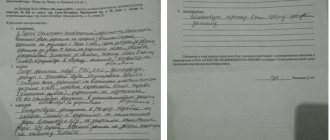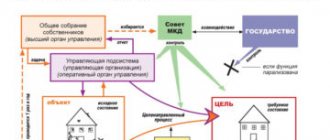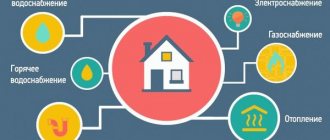Home / Real estate / Land / Inheritance of land plots
Back
Published: 01/26/2017
Reading time: 11 min
0
1490
The right of lifelong inheritable ownership of a land plot is currently considered one of the most widespread, along with the right of ownership of land.
It is for this reason that a fairly popular issue is obtaining and securing from a legal point of view the right to lifelong inheritable use of land. How exactly should this right be registered? And how should the whole process be regulated from a legislative perspective?
- Letter of the law
- What is the right of lifelong inheritable ownership of land?
- Who can receive it and on what basis?
- Features of the right of lifelong inheritable ownership of a land plot
- How to register a right?
- Termination of the right of hereditary ownership of land
Letter of the law
The regulation of issues of registration of the right of inherited lifelong ownership of land occurs with the help of two large regulations, one of which is the Land Code of the Russian Federation, and the other is the Civil Code of the Russian Federation.
The Land Code regulates the issue of lifelong inheritable ownership of land in its Article 31. This article discusses the issues of formalizing such a right, as well as possible options for acquiring ownership of a plot.
The Civil Code regulates all issues related to this special right within the framework of Article 265, which not only fully defines the concept of the right of lifelong inheritable possession from a legal point of view, but also considers options for disposing of a plot acquired on the basis of such a right.
To do this, you must provide to Rosreestr:
- A document confirming ownership of the plot under the right of night vision
- Cadastral passport with survey carried out and boundaries established
- Power of attorney from the client
For the time being, it is still possible to obtain a PNV plot located on the lands of settlements for free for those who have inherited this plot, or for those who have registered buildings within the boundaries of the plot.
If a PNV plot is located on agricultural land, such a plot is subject to redemption from municipal property for an amount not exceeding 15% of the cadastral value.
Federal Law dated October 25, 2001 N 137-FZ (as amended on June 8, 2015) “On the implementation of the Land Code of the Russian Federation” states:
9.1. If a land plot was provided before the entry into force of the Land Code of the Russian Federation for personal subsidiary farming, dacha farming, gardening, gardening, individual garage or individual housing construction on the right of lifelong inheritable ownership or permanent (indefinite) use, the citizen who owns such a land plot on such law, has the right to register ownership of such a plot of land, except for cases where, in accordance with federal law, such a plot of land cannot be provided for private ownership.
Let's consider a specific option.
A person bought a residential building located on a plot of lifelong inheritable ownership of the PNV, the old owner did not re-register the land as a property or lease, he simply handed over the old Certificate.
What is the right of lifelong inheritable ownership of land?
As mentioned above, a detailed description of the right to lifelong inheritable ownership of land is given in Article 265 of the Civil Code of the Russian Federation. According to the provisions of this article, such a right is understood as a special type of ownership of a land plot, which excludes any possibility of its implementation, except for transfer by inheritance.
Such a right implies exclusive ownership of a land plot and its use, while any attempts to sell the existing plot will be considered illegal, and transactions will be recognized as void.
Another important feature of the right of lifelong inheritable ownership of land is the fact that the plot to which this right applies can only be in state and municipal ownership. If the plot was once registered as a property, the right of lifelong inheritable ownership will no longer apply to it.
Speaking about the peculiarities of this legal status of land plots, it should also be noted that the subjects of law in such legal relations will be only individuals . Even if a will has been drawn up, according to which the land plot should be transferred to a legal entity by way of inheritance, in this part the will will be declared invalid, since the legal entity does not have the right to inherit such a plot.
Despite the fact that the plot is not owned, its owner has the right to erect a structure on it, which can be officially registered by obtaining ownership rights to it.
If the entire procedure for registering as real estate in relation to the erected structure is followed, then the transfer of the plot can be made by another method other than inheritance. In this case, the rule of the current legislation will apply, according to which, along with a capital structure that has undergone the registration procedure as real estate, the land plot on which such a structure is located can also be transferred.
In this case, the transfer options can be different: both the only one permitted for this category of plots in the form of inheritance, and through a gift or sale.
Who can receive it and on what basis?
Speaking about obtaining the right to lifelong inheritable ownership of a land plot, it should be noted that land can be obtained on such grounds in only one way - through inheritance on a specific plot. There are no other grounds for acquiring the right to lifelong inheritable ownership of a land plot, since the state issuance of land using such a right was discontinued in 1992 from the moment appropriate changes were made to the land legislation in force at that time.
Since the emergence of a lifelong inheritable right to land ownership is a legally significant action, its occurrence is subject to mandatory registration in the Unified State Register of Real Estate Rights. After entering the relevant information into this register, the heir receives a certificate of such right, on the basis of which he can subsequently formalize ownership of the land plot.
The basis for acquiring the right to lifelong inheritable ownership of a land plot is determined in accordance with the current legislation in the field of inheritance legal relations. Since this area of civil law implies two options for registering an inheritance - by will and by law, there are two possible grounds for the emergence of such a right of ownership:
- If an individual has entered into inheritance rights by law;
- Or the inheritance was opened in accordance with the will of the testator by drawing up a will.
In both cases, it is necessary to remember that this right, as well as the transferred land plot, will be subject to all the basic rules of the current legislation within the framework of inheritance legal relations.
Commentary on Article 21 of the Land Code of the Russian Federation
The right of lifelong inheritable ownership was first provided for by the Fundamentals of Legislation of the USSR and Union Republics on Land <213> in 1990 and was subsequently enshrined in the original edition of the Land Code of the RSFSR <214> in relation to land plots intended for running peasant (farm) farming; individual housing construction and personal subsidiary plots in populated areas; gardening; individual or collective dacha construction, construction of individual and collective garages; entrepreneurial activity and other purposes not prohibited by law. ——————————— <213> Fundamentals of legislation of the USSR and union republics on land dated February 28, 1990 // Gazette of the SND of the USSR and the USSR Supreme Court. 1990. N 10. Art. 129.
<214> Land Code of the RSFSR dated April 25, 1991 N 1103-1 // Gazette of the SND of the USSR and the USSR Armed Forces. 1991. N 22. Art. 768.
Since the mid-1990s, there has been a tendency towards the gradual removal of the right of lifelong inheritable ownership from the texts of regulatory legal acts and the disappearance of the category of landowners. According to paragraph 1 of the commented article, after the entry into force of the Land Code, the provision of a land plot to citizens on the right of lifelong inheritable ownership is not allowed, and the draft law N 444365-6 introduced to the State Duma “On amendments to the Land Code of the Russian Federation and certain legislative acts of the Russian Federation in terms of improving the procedure for providing land plots that are in state or municipal ownership” and it is proposed to completely exclude the commented article from the text of the current Land Code.
The right of lifelong inheritable ownership is possible only in relation to land plots that are in state or municipal ownership.
The landowner is granted the right to own and use a land plot, including the construction of buildings, structures and other real estate, with the establishment (clause 2 of the commented article) of a ban on the disposal of a land plot, with the exception of inheritance and the voluntary renunciation of a person’s right on the basis of Art. 53 ZK. The Supreme Court of the Russian Federation indicated (see paragraph 74 of the Resolution of the Plenum of the Supreme Court of the Russian Federation of May 29, 2012 N 9) that the inheritance includes and is inherited on a general basis the land plot owned by the testator or the right of lifelong inheritable ownership of the land plot <215>. At the same time, the provision of paragraph 78 of the said Resolution of the Plenum of the Armed Forces of the Russian Federation is extremely important, according to which in the case of inheritance by several persons, each heir acquires a share in the specified right, regardless of the divisibility of the land plot. The heirs of a land plot that belonged to the testator under the right of lifelong inheritable ownership can only be citizens, and the inclusion in the will of an order regarding such a land plot in favor of a legal entity entails in this part the invalidity of the will. ——————————— <215> If the right to a land plot belongs to several persons, a share in the right of common ownership of the land plot or a share in the right of lifelong inheritable ownership of the land plot is inherited.
The right to lifelong inheritable ownership of a land plot in accordance with Art. 4 of the Law on State Registration of Rights to Real Estate and paragraph 1 of Article 131 of the Civil Code of Russia is subject to state registration.
As in the case of granting a land plot for perpetual use, the right of lifelong inheritable ownership can be re-registered, but there is no time limit for this.
Landowners pay land tax in the same way as owners and persons to whom land plots belong to the right of perpetual use (see commentary to Article 20 of the Land Code).
Features of the right of lifelong inheritable ownership of a land plot
The right of lifelong inheritable ownership of a land plot has its own characteristics regarding the implementation of existing plans for the disposal and operation of a specific land plot. These features will include:
- The ability to use the land only in a way that is permitted by its intended purpose (for example, if the site is classified as agricultural land, the construction of an apartment building on it will be prohibited even after registration of ownership of the site);
- If a site is used in such a way that its level of fertility is significantly reduced, the right to use it may be revoked;
- A plot that is acquired by exercising the right of lifelong inheritable ownership of a land plot cannot participate in any transaction, regardless of whether it is the object of a gift or a pledge;
- As mentioned above, the only legally significant action that can be carried out with such an allotment can only be its transfer by inheritance.
The list of these features is established within the framework of current legislation and can only be changed if changes are made to the relevant rules of law.
Features of the right to own NVGs:
- You can own a plot
- Can be used, built, planted
- Can be passed on by inheritance (clause 2 of article 21 of the Land Code of the Russian Federation).
- Cannot be disposed of - sold, rented, exchanged
It’s a paradox - during your lifetime you cannot sell a plot of land with such a right; you need to re-register the plot as ownership and make an entry in the Unified State Register of Rights. Since the land continues to remain the property of the state, that is, the municipality. And after the death of the owner, the heirs will immediately receive ownership of the plot.
You can also re-register the plot not as ownership, but as lease, in order to sell the lease right in the future.
There is a danger that if such a PNV is not re-registered as ownership and falls under some kind of federal development, it may be seized without any material compensation to the owner, since, let me remind you, this is the property of the municipality.
Thus, I strongly recommend that all citizens and realtors providing services for registering land plots of ownership before 2021 register ownership of PNV .
How to register a right?
If a plot with the right of lifelong inheritable ownership was received by inheritance, it must be officially registered by obtaining the appropriate certificate. Registration of this right, together with the issuance of the corresponding title document, will be carried out by territorial divisions of Rosreestr bodies located in the same area as the inherited plot.
To obtain the appropriate certificate, the owner of the plot must contact the Rosreestr authorities with an application to register such a right. In addition to the application, you will also need to provide the following documents:
- Certificate of the right to lifelong inheritable ownership of land (regardless of whether these rights were entered into by law or by will);
- Certificate of such right issued to the testator;
- Documents confirming the identity of the heir;
- Certificates confirming the absence of any encumbrances on the site;
- Documents that confirm the rights of the representative to submit an application (power of attorney indicating the limits of the representative’s powers).
After submitting all the necessary documents and issuing a receipt to the applicant, which will indicate the date of acceptance of the entire package by the Rosreestr authorities or the territorial division of the MFC, within a period not exceeding ten days from the date of registration of the application, all documents are checked and, if they are completed correctly , a certificate of the right of lifelong inheritable ownership of land to a specific plot is issued.
It is this certificate that will be the fundamental document if the owner wants to formalize ownership of the land, since this document will be in the nature of the main title document confirming the rights of the applicant.
Residents of St. Petersburg can participate in the program for relocating communal apartments in St. Petersburg. Some categories of citizens have the right to receive a free plot of land. But to get it, you need to stand in line. You can find out how to do this here.
In case of agreement to allocate a land plot, the administration must formalize the corresponding decision. Read more about this in our article.







